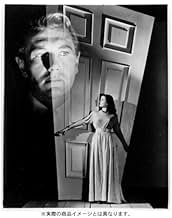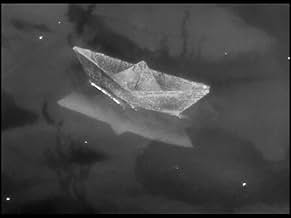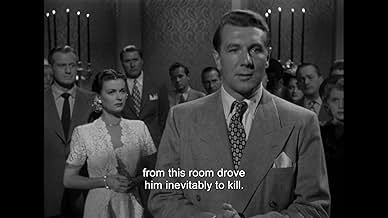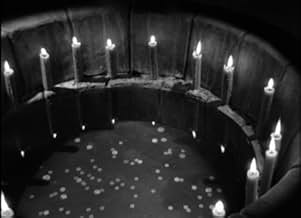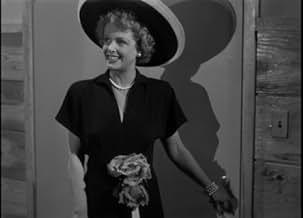NOTE IMDb
6,6/10
6,1 k
MA NOTE
Une femme suspecte que son nouveau mari veuille la tuer lorsqu'ils s'installent dans un vieux manoir de la côte Est.Une femme suspecte que son nouveau mari veuille la tuer lorsqu'ils s'installent dans un vieux manoir de la côte Est.Une femme suspecte que son nouveau mari veuille la tuer lorsqu'ils s'installent dans un vieux manoir de la côte Est.
- Réalisation
- Scénario
- Casting principal
Robert Barber
- Altar Boy
- (non crédité)
Ray Beltram
- Townsman
- (non crédité)
Virginia Brissac
- Sarah
- (non crédité)
Ralph Brooks
- Guest in Home Tour
- (non crédité)
Albert Cavens
- Guest in Home Tour
- (non crédité)
Tom Chatterton
- Judge
- (non crédité)
David Cota
- Small Mexican Knife Fighter
- (non crédité)
Frank Dae
- Country Squire
- (non crédité)
Avis à la une
Secret Beyond the Door is directed by Fritz Lang and adapted to screenplay by Silvia Richards from a story by Rufus King. It stars Joan Bennett, Michael Redgrave, Anne Revere, Barbara O'Neil and Natalie Schafer. Music is by Miklós Rózsa and cinematography by Stanley Cortez.
After a whirlwind romance, Celia Barrett (Bennett) marries Mark Lamphere (Redgrave) but finds once the honeymoon is over his behaviour becomes quite odd...
A troubled production and troubling reactions to it by the critics and Lang himself! Secret Beyond the Door is very much in the divisive half of Lang's filmic output. Taking its lead from classic era Hollywood's keen interest with all things Freudian, and doffing its cap towards a number of "women in peril at home" films of the 1940s, it's a picture that's hardly original. Yet in spite of some weaknesses in the screenplay that revolve around the psychological troubles of Mark Lamphere, this is still a fascinating and suspenseful picture.
I married a stranger.
Draped in Gothic overtones and astonishingly beautiful into the bargain, it's unmistakably a Lang film. His ire towards the cast and studio, where he was usurped in the cutting room and with choice of cinematographer, led Lang to be very dismissive towards the piece. However, it contains all that's good about the great director. Scenes such as the opening involving a paper boat on ripples of water, or a sequence that sees Mark dream he is in a courtroom full of faceless jurors, these are indelible images. Then there's the lighting techniques used around the moody Lamphere mansion that are simply stunning, with Cortez (The Night of the Hunter) photographing with atmospheric clarity.
Blades Creek, Levender Falls.
Elsewhere the characterisations are intriguing. Mark is troubled by something and we learn it's about women in his life, while his "hobby" of reconstructing famous murder scenes in the rooms of the mansion, is macabre and really puts a kinky distortion in the narrative. Celia marries in haste but is surprisingly strong, her character arc given heft by the fact we think she may well be prepared to die for love. Then there's the house secretary, Miss Robey (O'Neil), a shifty woman with a headscarf covering an unsightly scar on one side of her face, and Mark's young son David (Mark Dennis) who is cold and detached and has some disturbing theories on his father's means and motivations.
Lilacs and locked doors.
Cast performances are not all top grade, and even though Redgrave doesn't push himself to required darker territories, the performances are involving and worthy of the viewer's undivided attention. Rózsa's musical score is a cracker, deftly switching from the romantic swirls that accompany Mark and Celia during their love courting, to being a stalking menace around the Lamphere house and misty grounds when danger and psychological distortion is near by. Technically it's a remarkable movie, where even allowing for some daftness involving the psychobabble, it's a picture that Lang fans can easily love. There are those who detest it, very much so, but if it does hit your spot it will get inside you and stay there for some time afterwards. 8/10
After a whirlwind romance, Celia Barrett (Bennett) marries Mark Lamphere (Redgrave) but finds once the honeymoon is over his behaviour becomes quite odd...
A troubled production and troubling reactions to it by the critics and Lang himself! Secret Beyond the Door is very much in the divisive half of Lang's filmic output. Taking its lead from classic era Hollywood's keen interest with all things Freudian, and doffing its cap towards a number of "women in peril at home" films of the 1940s, it's a picture that's hardly original. Yet in spite of some weaknesses in the screenplay that revolve around the psychological troubles of Mark Lamphere, this is still a fascinating and suspenseful picture.
I married a stranger.
Draped in Gothic overtones and astonishingly beautiful into the bargain, it's unmistakably a Lang film. His ire towards the cast and studio, where he was usurped in the cutting room and with choice of cinematographer, led Lang to be very dismissive towards the piece. However, it contains all that's good about the great director. Scenes such as the opening involving a paper boat on ripples of water, or a sequence that sees Mark dream he is in a courtroom full of faceless jurors, these are indelible images. Then there's the lighting techniques used around the moody Lamphere mansion that are simply stunning, with Cortez (The Night of the Hunter) photographing with atmospheric clarity.
Blades Creek, Levender Falls.
Elsewhere the characterisations are intriguing. Mark is troubled by something and we learn it's about women in his life, while his "hobby" of reconstructing famous murder scenes in the rooms of the mansion, is macabre and really puts a kinky distortion in the narrative. Celia marries in haste but is surprisingly strong, her character arc given heft by the fact we think she may well be prepared to die for love. Then there's the house secretary, Miss Robey (O'Neil), a shifty woman with a headscarf covering an unsightly scar on one side of her face, and Mark's young son David (Mark Dennis) who is cold and detached and has some disturbing theories on his father's means and motivations.
Lilacs and locked doors.
Cast performances are not all top grade, and even though Redgrave doesn't push himself to required darker territories, the performances are involving and worthy of the viewer's undivided attention. Rózsa's musical score is a cracker, deftly switching from the romantic swirls that accompany Mark and Celia during their love courting, to being a stalking menace around the Lamphere house and misty grounds when danger and psychological distortion is near by. Technically it's a remarkable movie, where even allowing for some daftness involving the psychobabble, it's a picture that Lang fans can easily love. There are those who detest it, very much so, but if it does hit your spot it will get inside you and stay there for some time afterwards. 8/10
This film sees Mark (Michael Redgrave) with a psychological problem. There are a few things wrong in his head, eg, he collects rooms where murders have been committed. He lays these rooms out exactly as they were, with original artifacts, at the time the murders were committed and devotes a wing of his house to them. When Celia (Joan Bennett) marries him, she only discovers his passion when a rain storm ruins the outside house-warming party they are giving, and he brings the guests indoors for a tour of the house.
What lies in room no.7? It is permanently locked and becomes Celia's object of curiosity. Also in the house are 3 slightly spooky other characters - Redgrave's sister Caroline (Anne Revere), his son David (Mark Dennis) from a previous marriage and his secretary Miss Robey (Barbara O'Neil). Its a good film, but I think if I was a woman I would have left him pretty early on in the relationship! While I could see where the film was heading, the actual ending is not what I expected. It's a spookily filmed story and it's quite memorable.
What lies in room no.7? It is permanently locked and becomes Celia's object of curiosity. Also in the house are 3 slightly spooky other characters - Redgrave's sister Caroline (Anne Revere), his son David (Mark Dennis) from a previous marriage and his secretary Miss Robey (Barbara O'Neil). Its a good film, but I think if I was a woman I would have left him pretty early on in the relationship! While I could see where the film was heading, the actual ending is not what I expected. It's a spookily filmed story and it's quite memorable.
Highly derivative this low-budget film noir thriller may be but with Fritz Lang at the helm, you forget the ridiculous plot and admire instead the cinematography and atmosphere he brings to proceedings. And when I say ridiculous, I mean it, how else to describe a storyline where a widowed architect marries a wealthy city girl and takes her to his big old house in the country where he's made over a number of the rooms into murder tableaux. You might think she'd look for the door marked "Exit", but no Joan Bennett herself gets obsessed with the one room he's locked up, the mysterious number 7 and before too long is making a copy of the key, so she can investigate, naturally at the dead of night.
Being the 40's the Freudian overtones are overpowering, as the husband, Michael Redgrave in his first Hollywood role, seems to be over-reacting to years of unhealthy female influence and dominance in his life as his mood swings like, well, I guess you'd say, a door.
In the background there's an apparently disfigured housekeeper Miss Robey, Redgrave's supportive sister and his difficult, moody son but the main tension is between the leads as it builds gradually to a fiery ending.
The plot may creak at times like an old floorboard, Redgrave and Bennett are somewhat stiff and cold in their parts and the continuity isn't all it could be, but if like me you like film noir settings then this is for you too. Thus we get Bennett's interior monologues, lots of shots of her in front of mirrors, lots of scenes with darkened doors and symbolic keys, and even a shroud-like mist followed by a thunderstorm on the climactic night. There are some great shots of starkly-lit corridors and a wonderfully imaginative dream sequence (yes, it has those too) of Redgrave's where he's prosecuting himself in front of a judge and jury whose faces are in shadow. Dmitri Tiompkin's atmospheric score adds a lot to the overall mystery and dread, particularly at the end.
This may not be Lang's best American film but there was more than enough in it to keep an avowed fan like me keenly watching.
Being the 40's the Freudian overtones are overpowering, as the husband, Michael Redgrave in his first Hollywood role, seems to be over-reacting to years of unhealthy female influence and dominance in his life as his mood swings like, well, I guess you'd say, a door.
In the background there's an apparently disfigured housekeeper Miss Robey, Redgrave's supportive sister and his difficult, moody son but the main tension is between the leads as it builds gradually to a fiery ending.
The plot may creak at times like an old floorboard, Redgrave and Bennett are somewhat stiff and cold in their parts and the continuity isn't all it could be, but if like me you like film noir settings then this is for you too. Thus we get Bennett's interior monologues, lots of shots of her in front of mirrors, lots of scenes with darkened doors and symbolic keys, and even a shroud-like mist followed by a thunderstorm on the climactic night. There are some great shots of starkly-lit corridors and a wonderfully imaginative dream sequence (yes, it has those too) of Redgrave's where he's prosecuting himself in front of a judge and jury whose faces are in shadow. Dmitri Tiompkin's atmospheric score adds a lot to the overall mystery and dread, particularly at the end.
This may not be Lang's best American film but there was more than enough in it to keep an avowed fan like me keenly watching.
Fritz Lang's creepy and atmospheric psychological thriller, 'Secret Beyond the Door (1948),' faces just one major obstacle that prevents it from being a completely satisfying film experience: the story is quite obviously derived from Hitchcock's 'Rebecca (1940),' which happens to be a superior film in almost every regard. This is not to question the talents or originality of Lang, since, of course, he was already an established director before Hitchcock ever got his break, but you can just tell how much this particular work was influenced by the Master of Suspense. Borrowing elements from the then-prevalent film noir movement, and adding shades of post-marriage paranoia from the likes of 'Rebecca' and Cukor's 'Gaslight (1944),' Lang also mixes in snippets of Freudian psychoanalysis, not unlike what I witnessed last week in Hitchcock's own 'Spellbound (1945).' The final product is not without its charm, and contains various moments of precisely-articulated suspense, but you can never overcome that niggling feeling that you've seen it all done better.
Joan Bennett plays Celia, a young lady who acquires a large amount of money after her brother's death and decides to take a holiday. It is here that she meets Mark Lamphere (Michael Redgrave), a mysterious and charming gentleman who excites in Celia intense suppressed feelings of rebellion and exhilaration. Following their marriage, a hastily-decided proposition that can only lead to trouble, Celia immediately begins to notice peculiarities in her new husband, and, after her arrival at Mark's extravagant residence, she finds the dwelling haunted by the shadow of his previous wife. Mark, it seems, houses an unhealthy preoccupation with murder, and has made a hobby out of collecting entire rooms in which unspeakable atrocities of passion were committed. But what of the one room that is kept securely locked, never to be opened by anyone? Celia concludes that the secret to unlocking the inner depths of her husband's disturbed mind lies within that single room, beyond the forbidden door. Though Silvia Richards' screenplay, from a story by Rufus King, often seems too incredible to take seriously, Lang's film remains an interesting achievement, and is nothing if not entertaining.
I found the promotional material for 'Secret Beyond the Door' to be grossly misleading. The image of Joan Bennett standing before a significantly-distorted door prompted me to expect a film of extreme German Expressionism, in the same vein as 'The Cabinet of Dr. Caligari (1920).' Fritz Lang, who developed his career in Germany during the 1920s, and having often used elements of the style, would presumably have been very adept at recreating the devilishly-twisted labyrinths of the human mind, but the only scene to even approach my stylistic expectations was the appropriately ambiguous and shadowy dream sequence, in which Michael Redgrave both prosecutes and defends his malevolent tendencies in court {this particular scene may even have influenced Hitchcock's heavily-stylised courtroom trial in 'Dial M for Murder (1954)}. The remainder of the film has the appearance of a typical 1940s film noir, with suitably shadowy cinematography by Stanley Cortez, supplemented by a voice-over by Joan Bennett. Also note the similarity between the character of Miss Robey (Barbara O'Neil) and Mrs. Danvers (Judith Anderson) from 'Rebecca,' most particularly in their respective final actions in each picture.
Joan Bennett plays Celia, a young lady who acquires a large amount of money after her brother's death and decides to take a holiday. It is here that she meets Mark Lamphere (Michael Redgrave), a mysterious and charming gentleman who excites in Celia intense suppressed feelings of rebellion and exhilaration. Following their marriage, a hastily-decided proposition that can only lead to trouble, Celia immediately begins to notice peculiarities in her new husband, and, after her arrival at Mark's extravagant residence, she finds the dwelling haunted by the shadow of his previous wife. Mark, it seems, houses an unhealthy preoccupation with murder, and has made a hobby out of collecting entire rooms in which unspeakable atrocities of passion were committed. But what of the one room that is kept securely locked, never to be opened by anyone? Celia concludes that the secret to unlocking the inner depths of her husband's disturbed mind lies within that single room, beyond the forbidden door. Though Silvia Richards' screenplay, from a story by Rufus King, often seems too incredible to take seriously, Lang's film remains an interesting achievement, and is nothing if not entertaining.
I found the promotional material for 'Secret Beyond the Door' to be grossly misleading. The image of Joan Bennett standing before a significantly-distorted door prompted me to expect a film of extreme German Expressionism, in the same vein as 'The Cabinet of Dr. Caligari (1920).' Fritz Lang, who developed his career in Germany during the 1920s, and having often used elements of the style, would presumably have been very adept at recreating the devilishly-twisted labyrinths of the human mind, but the only scene to even approach my stylistic expectations was the appropriately ambiguous and shadowy dream sequence, in which Michael Redgrave both prosecutes and defends his malevolent tendencies in court {this particular scene may even have influenced Hitchcock's heavily-stylised courtroom trial in 'Dial M for Murder (1954)}. The remainder of the film has the appearance of a typical 1940s film noir, with suitably shadowy cinematography by Stanley Cortez, supplemented by a voice-over by Joan Bennett. Also note the similarity between the character of Miss Robey (Barbara O'Neil) and Mrs. Danvers (Judith Anderson) from 'Rebecca,' most particularly in their respective final actions in each picture.
Celia Barrett is a New Yorker with a trust fund and one of the city's most eligible single women. On a trip to Mexico she meets and falls for the charming Mark Lamphere, and later the couple marry. Returning to his home and pushing him to let her finance his passion for collecting "rooms", Celia starts to suspect that all might not be right with this perfect man she has landed and indeed the secrets in his house and in his past soon start to mount.
I watched this on the back of positive reviews from a couple of people on this site; perhaps I should have read further though because I didn't find the wonderfully intelligent noir that they claimed to have seen. Perhaps these commentators have not seen the film Rebecca which sort of covers similar themes but does it much, much better than this film does, but for me I found it hard to care about this. Visually I liked it and credit to Lang because his direction and work with his cinematographer does produce some really well set up scenes that do have great atmosphere. However this is not repeated in the material which is not as intelligent as it would like to think itself. Indeed it is terribly overwrought and melodramatic and offers little to counter it.
As a result the cast have to thanklessly play it up the best they can. I thought than Bennett did as good a job as she could have hoped to have done. She isn't brilliant though but she plays detective well. More important but not much cop is Redgrave; OK the blame lies more on the material than in his performance but given how little was conveyed by words at times, his performance was important but not up to the task.
Overall then, a fairly overdone melodrama that doesn't really convince in how it uses psychoanalysis to inform and direct its narrative. It may look great but the substance just isn't there from the start right down to the insultingly simplistic final scene.
I watched this on the back of positive reviews from a couple of people on this site; perhaps I should have read further though because I didn't find the wonderfully intelligent noir that they claimed to have seen. Perhaps these commentators have not seen the film Rebecca which sort of covers similar themes but does it much, much better than this film does, but for me I found it hard to care about this. Visually I liked it and credit to Lang because his direction and work with his cinematographer does produce some really well set up scenes that do have great atmosphere. However this is not repeated in the material which is not as intelligent as it would like to think itself. Indeed it is terribly overwrought and melodramatic and offers little to counter it.
As a result the cast have to thanklessly play it up the best they can. I thought than Bennett did as good a job as she could have hoped to have done. She isn't brilliant though but she plays detective well. More important but not much cop is Redgrave; OK the blame lies more on the material than in his performance but given how little was conveyed by words at times, his performance was important but not up to the task.
Overall then, a fairly overdone melodrama that doesn't really convince in how it uses psychoanalysis to inform and direct its narrative. It may look great but the substance just isn't there from the start right down to the insultingly simplistic final scene.
Le saviez-vous
- AnecdotesThe grove of trees through which Celia (Joan Bennett) runs when she flees the house is the same grove through which the Wolf Man ran in Le Loup-garou (1941), also made by Universal. In particular, the tree, against which she leans, is the same one under which the Wolf Man was beaten.
- GaffesWhen Celia takes an impression of the key in wax, she only takes the impression on one side, which would render the key made from that impression useless without the reverse side.
- Citations
Mark Lamphere: You were living that fight. You soaked it all in - love, hate, the passion. You've been starved for feelings - any real feelings. I thought: 20th Century Sleeping Beauty. Wealthy American girl who has lived her life wrapped in cotton wool but she wants to wake up. Maybe she can.
Celia Barrett: Is it as hard as all that?
Mark Lamphere: Most people are asleep.
- ConnexionsFeatured in Vampira: Secret Beyond the Door... 1947 (1956)
Meilleurs choix
Connectez-vous pour évaluer et suivre la liste de favoris afin de recevoir des recommandations personnalisées
- How long is Secret Beyond the Door...?Alimenté par Alexa
Détails
- Date de sortie
- Pays d’origine
- Langues
- Aussi connu sous le nom de
- Secret Beyond the Door...
- Lieux de tournage
- Société de production
- Voir plus de crédits d'entreprise sur IMDbPro
Box-office
- Budget
- 1 500 000 $US (estimé)
- Durée1 heure 39 minutes
- Couleur
- Rapport de forme
- 1.33 : 1
Contribuer à cette page
Suggérer une modification ou ajouter du contenu manquant

Lacune principale
What is the German language plot outline for Le secret derrière la porte (1947)?
Répondre

